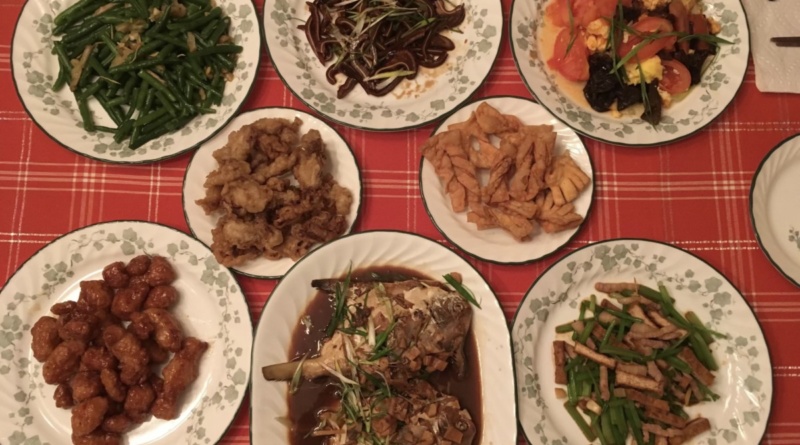DHS students prepare to celebrate Lunar New Year
PHOTO: Traditional soup and fish dishes are what set apart many variations of Lunar New Year.
By Genna Olavarri,
BlueDevilHUB.com Staff–
Lunar New Year begins Tuesday, Feb. 1.
The holiday is a celebration based on the lunar calendar; it recognizes the second new moon after the Winter Solstice and often the new moon closest to Lichun, or the beginning of spring.
In Western countries, the holiday is often referred to as Chinese New Year, but it is celebrated by many different Asian cultures.
In Korea, for instance, the celebration is called Seollal and in Vietnam, the holiday is called Tét Nguyên Đán (Tet).
“A lot of people don’t realize that there are a handful of Asian countries that celebrate the Lunar New Year,” Davis High senior Ha-Khanh Pham said. “I notice that no one really knows about Tet, but I think a part of it is because big aspects of the new year (holidays) are the same.”
Key differences in the celebrations include their folklore— or myth-based origins— as well as unique traditional foods. The rice cake soup dish Tteokguk is an example of a traditional Korean new years dish.
“It is a tradition to eat a specific type of soup on new years, in hopes of bringing good luck and to gain a year of age by each bowl of soup you eat,” John Neaverth said, a sophomore and Korean Culture Club project manager.
In many observations of the holiday, people eat foods and partake in certain traditions associated with good fortune.
“There’s dishes that are commonly prepared like, just steamed fish, because it’s supposed to bring you luck,” sophomore Kina Li said.
In Chinese culture, people may eat fish to welcome abundance in the new year because a Mandarin word for ‘fish’ has a similar pronunciation to the word meaning ‘abundance’. “It’s like a pun,” Li said.
The holiday is also typically observed through family gatherings and rituals to honor ancestors.
“A super big part is that Vietnamese people traditionally will set up a family (altar with) incense and will put out offerings of food for their ancestors,” Pham said.
However, Neaverth believes the Korean ritual of honoring ancestors, Jesa, is “becoming less common in families due to shifts in generations as grandparents tend to be the host of the ritual rather than that of the younger generations,” Neaverth said.
“(But) there are still many families that hold the ritual which overall shows the diversities in celebrating the holiday from family to family.”
According to Neaverth, a Korean Lunar New Year tradition that is still widely practiced is sebae: the ritual of respectfully bowing to and greeting elders in exchange for money “as a sign of good luck and prosperity.”
Another common Lunar New Year tradition across cultures is adults gifting children money, sometimes in red envelopes or packets.
DHS Chinese Culture Club president Zhiyao Cheng moved from China to the US three years ago. With most of her family still in China, Cheng’s family sends her red packets “through the WeChat so we can (still) receive them,” Cheng said.
WeChat is a messaging app developed by the Chinese company Tencent. One of the features of the app allows people to send virtual red packets to their family and friends around the world. “It’s really fun,” Cheng said.
When Cheng was younger, she used to travel to other cities in China to visit her friends and extended family to celebrate Lunar New Year.
On the first day of the holiday, she would “stay with our grandparents and … make the dumplings,” Cheng said.
“After we came to the U.S, we still keep some traditions… (we) make the dumplings and help prepare some traditional dishes,” Cheng said. “I really miss my grandparents and my other family members.”
While Cheng’s observation of Chinese New Year has been altered by the distance from her family, junior Alison Nguyen’s typical celebration of Tet has been interrupted by the pandemic.
“Usually we would have a big family reunion where we’d all get together and have like this big elaborate dinner with some of these traditional holiday foods that you won’t typically eat,” Nguyen said.
“(Because) of COVID we haven’t been able to do as much these past few years.”
Other DHS students have more casual observations of the holiday.
Since most of senior Jason Ma’s extended family also lives in China, his new year celebrations have “always been like a very much parents and siblings thing, not like a cousins and grandparents thing,” Ma said.
Even still, Ma enjoys the annual celebration and his family’s associated traditions, saying that being able to celebrate the holiday makes him feel more connected to his culture.
“It’s nice to be able to just sit around a huge table and just eat a lot of food… you know, just normal big family dinner stuff,” Ma said.
The DHS Chinese Culture Club will be decorating the library for Lunar New Year and hosting a virtual celebration on Feb. 5.
The DHS Korean Culture Club will also be observing the holiday with a presentation on Lunar New Year traditions and foods on Feb. 1.



